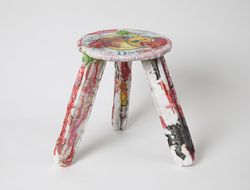Difference between revisions of "Thank You"
(Created page with "{{Infobox |title = HDPE |image = CK-HDPE 01.jpg |param1 = 2018 |param2 = |param3 = |param4 = Studio Produced }} <gallery> File:CK-HDPE 01.jpg File:CK-HDPE 02.jpg Fil...") |
|||
| (11 intermediate revisions by the same user not shown) | |||
| Line 1: | Line 1: | ||
{{Infobox | {{Infobox | ||
|title = | |title = Thank You (Have a Nice Day) | ||
|image = CK-HDPE 01.jpg | |image = CK-HDPE 01.jpg | ||
|param1 = [[2018]] | |param1 = [[2018]] | ||
|param2 = | |param2 = Stools are 13 x 13 x 13 inches | ||
|param3 = | |param3 = High Density Polyethylene (HDPE) | ||
|param4 = [[Studio Produced]] | |param4 = [[Studio Produced]] | ||
}} | }} | ||
'''Thank You (Have a Nice Day)''' is a project exploring the reuse of [https://en.wikipedia.org/wiki/Polyethylene#High-density_polyethylene_(HDPE) high density polyethylene] (HDPE) and a contribution to ''PlasticScene'' (Sept. 15-23, 2018), a exhibition of works made from post consumer waste plastic, organized by London based designer [http://www.jamesmichaelshaw.co.uk James Shaw] and Laura Houseley, Editor-in-Chief of [http://moderndesignreview.com Modern Design Review]. Two stools were produced for the exhibition. | |||
HDPE can be melted at 130°C (266°F) at home with a toaster oven in baking pans lined with wax paper. | |||
Normally, reusing plastic involves chopping the waste plastic into small bits so it can melt evenly. This chopping process creates an almost new raw material that obscures any connection to the plastic's previous life. To create an obvious visual connection to the plastic's history, common graphics from New York City plastic bags were cut out and carefully laid onto the surface contacting the wax paper before the mold was filled with chopped up white HDPE. Once the plastic is brought up to melting temperature, the mold is removed from the oven and compressed using a block of wood against the mold. This pressing causes the graphics to warp and distort. | |||
Plastic bags, being made from HDPE, are very much recyclable. However the form of the plastic bag is difficult for the machines in sorting facilities to manage. This means often they are landfilled. | |||
<gallery> | <gallery> | ||
File:CK-HDPE 01.jpg | File:CK-HDPE 01.jpg | ||
File:CK-HDPE 02.jpg | File:CK-HDPE 02.jpg | ||
File:CK-HDPE Test 01.jpg | {...} | ||
</gallery> | |||
==Melting Tests== | |||
<gallery> | |||
File:CK-HDPE Test 01.jpg| A test made in a wood mold. The wood began to smoke the plastic. | |||
File:CK-HDPE Test 02.jpg | File:CK-HDPE Test 02.jpg | ||
File:CK-HDPE Test 03.jpg | File:CK-HDPE Test 03.jpg | ||
Latest revision as of 16:54, 13 June 2022
| Design Year: | 2018 |
|---|---|
| Dimensions: | Stools are 13 x 13 x 13 inches |
| Materials: | High Density Polyethylene (HDPE) |
| Manufacturer: | Studio Produced |
Thank You (Have a Nice Day) is a project exploring the reuse of high density polyethylene (HDPE) and a contribution to PlasticScene (Sept. 15-23, 2018), a exhibition of works made from post consumer waste plastic, organized by London based designer James Shaw and Laura Houseley, Editor-in-Chief of Modern Design Review. Two stools were produced for the exhibition.
HDPE can be melted at 130°C (266°F) at home with a toaster oven in baking pans lined with wax paper.
Normally, reusing plastic involves chopping the waste plastic into small bits so it can melt evenly. This chopping process creates an almost new raw material that obscures any connection to the plastic's previous life. To create an obvious visual connection to the plastic's history, common graphics from New York City plastic bags were cut out and carefully laid onto the surface contacting the wax paper before the mold was filled with chopped up white HDPE. Once the plastic is brought up to melting temperature, the mold is removed from the oven and compressed using a block of wood against the mold. This pressing causes the graphics to warp and distort.
Plastic bags, being made from HDPE, are very much recyclable. However the form of the plastic bag is difficult for the machines in sorting facilities to manage. This means often they are landfilled.







